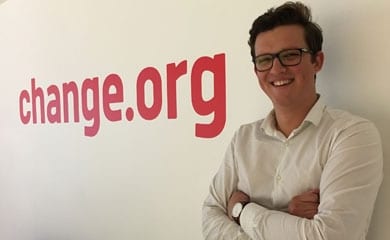
Clicktivism gets a bit of a bad rap from the commentariat. It’s often dismissed as the outrageratti clicking ineffectively from their armchairs in the place of the “real” activism that requires getting out of the lounge room with a placard and a genuine cause.
Change.org is the home of clicktivism. It’s a pretty simple way of aggregating online outrage in one place and presenting it as a collective voice. I’ve done my share of eyerolling at the change.org petitions that scroll through my feed, but perhaps I dismissed it too quickly. Cynicism might make for some good one-liners, but it’s not always based in fact.
I’m all about data, and the data from Change.org brings up some interesting facts.
Whilst women are under-represented in Parliament and board rooms, they’re over-represented on Change.org. 60% of their 3.4 million users are women. Women are also more influential: of the 34 top victories with over 10,000 signatures, 20 were from women.
One in seven Australians have signed or started a Change.org petition. A petition wins a victory every 24 hours, a victory being defined as: “when the decision maker on the petition grants the petitioner’s ask”
Nathan Elvery, Head of Change.org Australia, told Women’s Agenda,
“In 2015, we saw some of the most heart-breaking personal stories of everyday Australians become public via the platform. We’ve seen the scale of change made by ordinary people dramatically increase this year. The diversity of petition starters is the broadest it has been since we launched in Australia four years ago. Mums and teenagers, business-people and seniors have all used Change.org to win battles ordinary people were told they could never win by themselves. They’ve shifted national policies, overturned unjust decisions, won personal battles and stood up for the voiceless. These people-powered victories, sparked by ordinary Australians, are triumphing on a scale unimaginable just a few years ago; a petition now wins every 24 hours in Australia.”
These are only a few of the change.org petitions that were started in 2015 and achieved their desired outcome:
- Shane Raisher (who died in March) – he got a melanoma wonder-drug on the PBS with his petition (172K signatures). He died just 3 months before it was approved, while his widow was pregnant with their second child.
- Katrina Keshishian, the gang rape survivor who successfully petitioned (134K signatures) the Attorney General to backflip on crime victim compensation cancellation. Huge policy backflip impacted 24,000 victims of crime.
- Maria Sevilla successfully petitioned (125K signatures) Peter Dutton to stop the deportation of her 9-year-old autistic son.
- Just weeks after her mother’s suicide, Josie Pohla, 14, started a Change.org petition (103K signatures) asking for domestic violence prevention lessons on the school curriculum. Josie had considered the violence in her household as normal – and wanted all kids taught that there’s nothing normal about domestic violence. Her petition persuaded Mike Baird to act and changed the school curriculum.
- Klaus Bartosch, a small businessman from the Gold Coast, successfully capped credit card surcharges, which new Treasurer Scott Morrison announced in October. His Change.org petition (90K signatures) was responsible for 5,000 submissions to the Murray financial system calling for them to be banned.
- Nona Westenrieder successfully petitioned (68K signatures) the disability services minister to fund the care of my disabled brothers at home, rather than forcing them to use that funding on out of home care.
- Kerrie Keepa petition (68K signatures) to train emergency staff in spotting suicide risks so another mother like her doesn’t lose her son to suicide, was successful.
- Pam Brunswick was sacked from the ambo job she loved while being treated for breast cancer – simply because she’d been away from work as a casual for over three months. It took the platform a matter of weeks what the Fair Work Commission could’ve laboured over for many months. With 61K signatures, Pam got her job back.
- Nutritionist, Jessie Reimers was outraged that the Heart Foundation were giving their ‘tick of approval’ to foods that cause heart disease, like Milo cereal, with 27% sugar, and receiving money from parent companies like Nestle, McDonald’s. The day after her petition delivery, the Foundation committed to a review. The tick was dropped on 8 Dec 2015.
- Alexandria Lancaster 14 year old son Connor McLeod is blind, together, they petitioned the RBA mum, 14: Reserve Bank to put tactile markings on bank notes and won in February 2015.
- Debra Tranter successfully blocked approval of a puppy farm from owners with a track record of animal abuse. Her petition (112K signatures) was the 4th largest win of 2015.
These are only a few of the hundreds, and yes some of them may have been small or even petty. Those ones probably didn’t get much support. But the petitions listed above are not petty, they are serious issues that change lives. Maybe some of them might have happened without a change.org petition, but it’s unlikely the individuals involved could have achieved such success without some way of informing people about their need and bringing supporters together in one place. Change.org does pretty much exactly what it says on the box – enables change – and in all those cases, change for the better.

